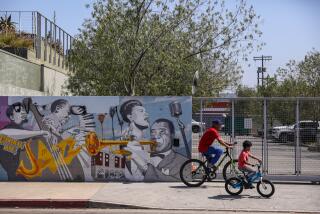Where Are Latinos in Post-O.J. Talk of Race Relations?
- Share via
Of everything that has bothered me in the wake of the O.J. Simpson trial, I’m most troubled by how invisible Latinos have been in the intellectual food fight over the state of race relations in L.A. Whether it be over the airways, in print or at the grocery store, the post-O.J. argument about race is between blacks and whites. Latinos, who make up 41% of the city’s population, have been cut out. It’s as if we are just the wallpaper in the arena where whites and African Americans are smearing each other in the argument over what the trial has done to us. We too are getting smeared, but we don’t have any pies to throw back.
Part of this is because blacks are indeed the majority minority in the East Coast power corridors, where the nation’s perceptions of the Simpson trial emanate from. When ABC News’ Ted Koppel conducted several “Nightline” broadcasts on the case last week, there was nary a brown face to speak of the trial’s legacy on this city’s different communities. I was so disheartened by the oversight that I changed the channel to see what the Dancing Itos and Jay Leno were up to.
I wasn’t the only one to notice the cold shoulder. Manuel Medrano, legal affairs analyst for KNBC-TV Channel 4 and one of the few visible Latinos in the O.J. Simpson trial, noticed it too. “It’s like we didn’t exist in the context of this case,” the former federal prosecutor told me. “The absence of that [Latino] voice speaks volumes.”
It sure does. It’s another indication that Latinos have yet to become equal partners in charting our city’s future.
A food fight about race is the last thing Latinos need because we’ll come out as dirty as everyone else who is in it. Then why get into it, some might ask? Because it’s still important if we’re to be equal partners in governing the city and Southern California. Latinos’ thoughts about race relations are just as important to the post-O.J. dialogue as what we do about street gangs and illegal immigration.
*
When I raised this with a newsroom colleague, she said: “Well, other than [prospective witness and housekeeper] Rosa Lopez, what are they going to say? This is about blacks’ search for justice and what the trial means for them.”
“Wrong!” I shot back. “It’s about what the trial has done to all of us.” In my view, the trial, which shouldn’t have been about race but about the pursuit of justice, has nevertheless put that issue on the city’s front burner. I regret that, but since it is, I think everybody should be included in the food fight.
Historically, Latinos have been secondary players in civil rights and race. African Americans were the vocal oppressed who developed the leaders and the strategies to overcome slavery and segregation. Latinos suffered segregation to a lesser degree, like Mexican-only days at public swimming pools the day before they were drained and refilled. Other than farm workers leader Cesar Chavez, Latinos had no one to rival Martin Luther King Jr. or Thurgood Marshall. It’s a political movement where leadership is still ceded to blacks. When every administration since President Eisenhower’s talked about racial equality or preserving minorities’ rights, Latinos understand the rhetoric to essentially apply to African Americans.
That still seemed the case when a group from the Mexican American Bar Assn. in Los Angeles spoke to Clinton Administration officials last week about several police shootings that the lawyers contend should be reviewed by federal officials for possible civil rights violations.
The MABA members were grateful for the attention from Clinton’s staff people, but some still couldn’t shake the notion that the officials may not fully empathize with the Latino lawyers’ concerns. “We’re still invisible,” one Chicano lawyer said. For Administration officials, “it’s still a black-and-white world.” When it comes to immigration or gangs, the Feds, the media, the pundits and City Hall are quick to seek the counsel of Latinos in the know. They want to know what we think. We have a lot of ideas. But if the topic is the widening gap among the races as a result of the Simpson trial, no Latino need apply. We don’t count.
*
To be taken seriously, Latinos must be more aggressive in speaking out. We have to make ourselves relevant. Just saying we’re part of the city isn’t enough.
“We are not part of that discussion on race and it’s our own fault,” says criminal defense attorney Irene Ayala, who did trial analysis for Channel 4 and KTLA Channel 5. “We don’t have the people who are aggressively pursuing our viewpoint.”
In fact, L.A. Latinos need a brown version of John Mack, president of the L.A. Urban League, Police Chief Willie Williams or even Johnnie Cochran. Right now, regardless of what you think of them, they’re part of the race dialogue. Their visibility and comments are shaping what others think of L.A. They’re also setting up the race agenda for the future.
The same can’t be said of the acknowledged Latino leaders in Southern California--unless, of course, Koppel asked them what they thought of Rosa Lopez.
More to Read
Sign up for Essential California
The most important California stories and recommendations in your inbox every morning.
You may occasionally receive promotional content from the Los Angeles Times.













